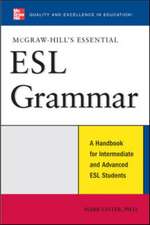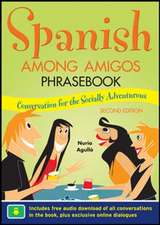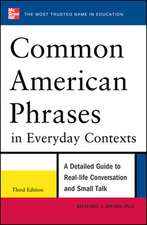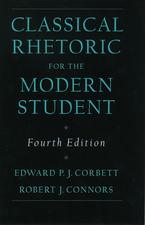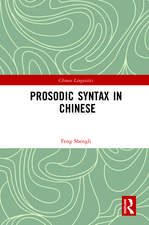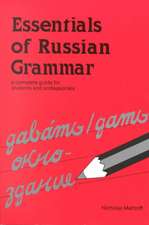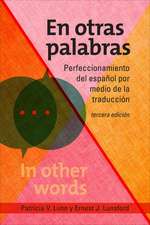Language Attitudes and Identities in Multilingual China: A Linguistic Ethnography
Autor Sihua Liangen Limba Engleză Hardback – 18 dec 2014
The role of language policies and the links between the interactional phenomena and other contextual factors are investigated through the multi-level analysis of linguistic ethnographic data. This study captures the long-term language socialisation process and the moment-to-moment construction of language attitudes at a level of detail that is rarely seen. The narrative is presented in a highly readable style, without compromising the theoretical sophistication and sociolinguistic complexities.
| Toate formatele și edițiile | Preț | Express |
|---|---|---|
| Paperback (1) | 383.71 lei 6-8 săpt. | |
| Springer International Publishing – 23 aug 2016 | 383.71 lei 6-8 săpt. | |
| Hardback (1) | 391.02 lei 6-8 săpt. | |
| Springer International Publishing – 18 dec 2014 | 391.02 lei 6-8 săpt. |
Preț: 391.02 lei
Nou
Puncte Express: 587
Preț estimativ în valută:
74.82€ • 78.13$ • 61.78£
74.82€ • 78.13$ • 61.78£
Carte tipărită la comandă
Livrare economică 15-29 aprilie
Preluare comenzi: 021 569.72.76
Specificații
ISBN-13: 9783319126180
ISBN-10: 3319126180
Pagini: 202
Ilustrații: XVI, 202 p. 12 illus.
Dimensiuni: 155 x 235 x 15 mm
Greutate: 0.49 kg
Ediția:2015
Editura: Springer International Publishing
Colecția Springer
Locul publicării:Cham, Switzerland
ISBN-10: 3319126180
Pagini: 202
Ilustrații: XVI, 202 p. 12 illus.
Dimensiuni: 155 x 235 x 15 mm
Greutate: 0.49 kg
Ediția:2015
Editura: Springer International Publishing
Colecția Springer
Locul publicării:Cham, Switzerland
Public țintă
ResearchCuprins
Part I: Introduction: Sociocultural and Sociolinguistic Backgrounds.- Dialect Issues in Multilingual China: A Dog That Has Barked.- The Politics and Sociolinguistics of Chinese Dialects.- Part II: Conceptual and Methodological Frameworks.- Researching Language Attitudes in Multilingual China.- Part III: Becoming Members of a Multidialectal City.- “Mother Tongues” of a Multidialectal City.- Language Socialisation in Multidialectal Households: a Case Study.- Part IV: Putonghua and Regional Dialects at School.- Language Socialisation in Educational Institutions.- Teachers’ Attitudes towards Dialects in School.- Part V: Discussion and Reflection.- Problematizing the Monolingual Norm in a Multidialectal City.- Schools in the Era of Multilingualism.- Language Attitudes in Heteroglossia: Methodological Reflections.- Appendix I: The Students’ Profiles.- Appendix II: The Schools and the Teachers’ Profiles.
Recenzii
“The book draws a necessarily complex picture of the various arrays of attitudes, and tries to trace and demonstrate the origins and directions of these arrays. For those who believe in or are bewildered by the complexity, hybridity, and fluidity of modern language experiences, this book would make for a pleasant read. The narrative of the book is clear, authentic, lively, and reflective while remaining intellectually sophisticated. It should be accessible to a broad readership.” (Chengtuan Li, Language in Society, Vol. 45 (1), 2016)
Textul de pe ultima copertă
These in-depth case studies provide novel insights in to the fast-changing language situation in multilingual China, and how it changes the meanings of language identity and language learning. This linguistic ethnographic study of language attitudes and identities in contemporary China in the era of multilingualism provides a comprehensive and critical review of the state of the art in the field of language-attitude research, and situates attitudes towards Chinese regional dialects in their social, historical as well as local contexts.
The role of language policies and the links between the interactional phenomena and other contextual factors are investigated through the multi-level analysis of linguistic ethnographic data. This study captures the long-term language socialisation process and the moment-to-moment construction of language attitudes at a level of detail that is rarely seen. The narrative is presented in a highly readable style, without compromising the theoretical sophistication and sociolinguistic complexities.
The role of language policies and the links between the interactional phenomena and other contextual factors are investigated through the multi-level analysis of linguistic ethnographic data. This study captures the long-term language socialisation process and the moment-to-moment construction of language attitudes at a level of detail that is rarely seen. The narrative is presented in a highly readable style, without compromising the theoretical sophistication and sociolinguistic complexities.
Caracteristici
A critical introduction of Chinese language policy and language education to an international audience The first-of-its-kind detailed analysis of the attitudes of an emerging Putonghua-as-first-dialect generation A wealth of original data supports novel insights on attitudes towards regional dialects and identity ? Includes supplementary material: sn.pub/extras








